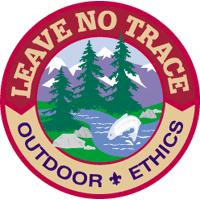
Respect Wildlife
Animal Thoughts
Play the roles of various animals and tell what they would think about actions taken by humans.
Goal
Participants will have fun considering how our choices affect the animals living in the areas we visit.
Time
15 minutes
Objectives
Participants will be able to:
- choose actions to minimize their impact to local animals
- recognize ways in which they scare or harm animals, even ones they don't see
Materials
- a bag of scenarios cut into individual slips of paper:
- You come upon a bush of huckleberries and pick them all for a special treat at camp.
- You pull two really nice walking sticks with cool beaver-chewed ends out of a dam across a meandering creekbed and the water rushes out the opening.
- You cut down a dead snag tree and use it for firewood.
- You yell across the meadow to your buddy that its time for dinner.
- It's too dark to do dishes after dinner so you wait to clean in the morning.
- You run out of rinse water so you rinse the soapy dishes off in the creek.
- You decide to have a campfire.
Motivator
Think about how you'd feel if someone walked in your front door uninvited and made himself at home. He watched TV for a few hours, ate all your snacks and soda, and then left without cleaning up after himself. How would you feel? Well, we do that whenever we hit the trail.
Presentation
- Ask for volunteers to play the roles of: Bear, Beaver, Bird, and Raccoon.
- Position the four animals around the area. They will respond with their thoughts for each scenario that is chosen.
- Everyone else gets to be campers. One at a time, they pull a scenario out of the bag and read it. If it would be more fun, they can act out the scenario too.
- Each animal in turn tells what he thinks about the actions taken and how it affects him.
- After all animals talk, everyone can discuss or add ideas before the next scenario.
- destroying the bird's nest that was in it. Or, killing the bugs the bird eats.
- killing the ant colony or bee hive that the bear was going to use to survive the winter.
- destroying the hollow cavity in which the raccoon sleeps.
- removing a lot of bio-mass that could have decayed and provided nutrients for new bushes, berries, and trees.
Reflection
Is there anything we do in the wild that doesn't affect the animals that live there?
What are some ways in general that we can minimize our impact on animals? (leave things as they are, be quiet, be alert)


